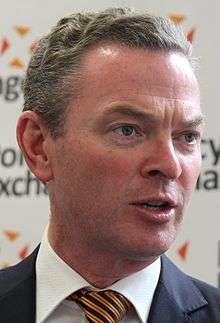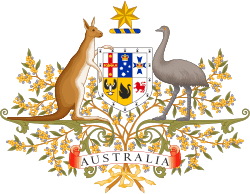Leader of the House (Australia)
| Leader of the House | |
|---|---|
| Style | The Honourable |
| Appointer | Governor-General on the recommendation of the Prime Minister of Australia |
| Inaugural holder | Sir Eric Harrison |
| Formation | 11 May 1951 |
| Deputy | Luke Hartsuyker |
In the Australian Parliament, the Leader of the House is the government minister responsible for the management of government business in the House of Representatives, including such matters as:[1]
- the order in which Government issues are to be dealt with
- tactical matters in reaction to impediments to such management
- negotiation with the Opposition's counterpart (the Manager of Opposition Business) about the order in which bills are to be debated, and
- time allotted for debate.
As the Australian Parliament is bicameral, the Leader of the House must also be aware of developments in the Senate, for example, in order to anticipate whether a bill may be returned to the House with amendments.
The office was created in 1951 by the Prime Minister at the time, Robert Menzies. The Leader of the House and the Deputy Leader are appointed by the Prime Minister. Since 18 September 2013, Leader of the House has been Christopher Pyne, and the current Deputy Leader of the House is Luke Hartsuyker. The duties of the Deputy Leader of the House is largely contingent, coming into play only when the Leader of the House is absent from the House or is on leave, when he or she is referred to as Acting Leader of the House.
List of Leaders of the House
The following individuals have been appointed as Leader of the Australian House of Representatives:
Note: For terms during the period 1951 to 1972, exact dates are taken from changes in Prime Minister. Other dates coincide with sitting periods of the House as an approximation of when terms began and ended.
References
- ↑ "Chapter 2: House, Government and Opposition". House of Representatives Practice (PDF). pp. 63–64.
- ↑ Macintyre, Stuart (1996). "Harrison, Sir Eric John". Australian Dictionary of Biography. Canberra: Australian National University. Retrieved 20 September 2007.
- 1 2 3 4 5 6 7 8 9 10 "Appendix 8: Leaders of the House". House of Representatives Practice (PDF).
- 1 2 Australian Parliamentary Library. "Ian McCahon Sinclair". Trove. National Library of Australia. Retrieved 16 February 2013.
- 1 2 Australian Parliamentary Library. "Mick Young". Trove. National Library of Australia. Retrieved 16 February 2013.
- ↑ Australian Parliamentary Library. "Lionel Bowen". Trove. National Library of Australia. Retrieved 16 February 2013.
- ↑ Australian Parliamentary Library. "Kim Beazley". Trove. National Library of Australia. Retrieved 16 February 2013.
- ↑ Australian Parliamentary Library. "Peter Reith". Trove. National Library of Australia. Retrieved 16 February 2013.
- ↑ Australian Parliamentary Library. "Tony Abbott". Trove. National Library of Australia. Retrieved 16 February 2013.
- ↑ Australian Parliamentary Library. "Anthony Albanese". Trove. National Library of Australia. Retrieved 16 February 2013.
- ↑ Australian Parliamentary Library. "Christopher Maurice Pyne". Trove. National Library of Australia. Retrieved 28 March 2012.

